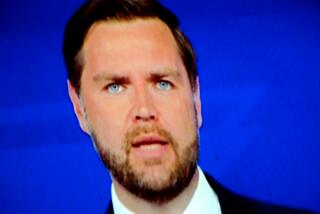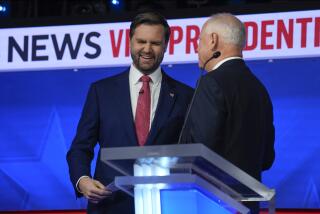No Knockout Blows as Sparks Fly All Around : Strategy: All three candidates seem determined to take best shots at final head-on confrontation.
- Share via
EAST LANSING, Mich. — There is something of astronomy in a presidential campaign, where the candidate’s orbits come only fleetingly into alignment at debates. There may have been no fireball as Bill Clinton, George Bush and Ross Perot crossed paths for the final time Monday, but the sparks that flew clearly set this debate apart from their previous meetings.
From now until Election Day, the three campaigns will return to circuits of their own: the whistle-stops and fly-arounds and TV blitzes that mark a homestretch, where intersection comes only by chance.
But those are safer courses, and as the three came together at Michigan State University, they and those around them seemed determined to take one last best shot from the now-familiar elevated stage with the deep blue backdrop.
Even Perot, more folksy commentator than combatant in the previous two debates, turned coldly confrontational as he launched unproved attacks on Bush’s dealings with Panama’s Manuel A. Noriega and Iraqi President Saddam Hussein.
Bush, who aides thought far too passive in last Thursday’s exchange, set his feet and squared his shoulders to take on Clinton almost from the moment the debate began. Ten separate times he accused Clinton of “a pattern” of deception.
And Clinton, who tried again to take on a dispassionate air, finally flared under the repeated attacks from Bush. “Anybody else can run the middle class down and run the economy in a ditch,” he said. “I want to change it.”
As each took the chance to leave the voters with one last impression, they seemed to boil their statements down to a single, indelible slogan: For Bush, “character”; for Clinton, “change,” and Perot, “absolutely we can win!”
His partisans in the audience warming to his attack, Bush zeroed in on Clinton’s record in Arkansas.
With his right hand thrust into the trouser pocket, he struck a pose of confidence urged on him by those who prepared him for the debate, but the words conveyed the harshness of a fist-pounding attack.
“I think it’s about time I start putting things in perspective. And I’m going to do that,” he said, with repeated demands that Clinton own up to his mistakes. “It’s not dirty campaigning because he’s been talking about my record for a half a year here, 11 months here. So we’ve got to do that. I gotta get it in perspective.”
Once, twice and then a third time he quoted Clinton’s hedging words of not-quite-support for Congress’ vote giving a go-ahead to the Persian Gulf War; and twice he urged “Mr. and Mrs. America” to watch their wallets if Clinton is elected.
If there was a certain sameness to yet one more three-cornered debate, and a familiar weariness on the faces of the advisers who trooped out one more time to proclaim victory for their camp, what made this debate different was that the candidates so rarely applied the brakes.
Perot went in hard and scrawled notes so furiously as his opponents spoke that the microphone picked up the scratching of his pen. Bush did not back off, and Clinton turned on his opponents with a directness he had not previously displayed.
Clinton threw back at Bush the President’s announcement in the first debate that in a second Bush term, James A. Baker III would be in charge of economic policy.
“The person responsible for economic policy in my Administration would be Bill Clinton,” he said sharply.
In one of the most direct, animated exchanges, Bush fired back: “That’s what worries me. He would do for the United States what he’s done for Arkansas. We do not want to be the lowest of the low.”
Samuel K. Skinner, the onetime White House chief of staff, explained Bush’s livelier performance by saying the President was more comfortable with the moderator-and-panel format Monday night than he had been four nights earlier in Richmond, Va., when members of a group of 209 undecided voters quizzed the candidates.
“I think he let it intimidate him a little before,” Skinner said of the previous format, “but he didn’t let it intimidate this time.”
Having conducted three debates in just nine days, interspersed with a separate vice presidential clash, the candidates had already spent much of October traveling along nearly parallel paths.
An anticipated first-round collision between Bush and Clinton in St. Louis was softened by Perot’s show-stealing intervention. At the second debate in Richmond, it was the audience and its admonitions that dampened the expected sparks.
When the candidates come together, sometimes it is their aides who come closest to a fiery collision.
It took a bouquet of flowers and a conciliatory drink to mend the wounds left by a verbal tussle between Clinton aide Steve Rabinowitz and Bush spokeswoman Alixe Glen, whose fiery tempers flared in a St. Louis hotel bar after the first debate.
Also after that debate, Bush deputy campaign manager Mary Matalin and Clinton strategist James Carville, sometime romantic partners whose politics have pulled them to opposition poles, found themselves back to back as each tried to convince reporters that his or her boss had won.
As Matalin sang Bush’s praise, Carville did the same for Clinton, until each suddenly swung around to confront the familiar voice. The startled look on each of their faces spoke of the friction that comes from a near miss.
But just as often the exchanges have been benign, a reflection of the common ground of political operatives. In St. Louis, a note left behind in a Bush press corps holding room by Clinton press secretary Dee Dee Meyers offered greetings to counterparts Marlin Fitzwater and Torie Clarke of the Bush camp. “Hi, Marlin and Torrie! (sic),” it said in a childlike scrawl. “Just stopped by to see you. Dee Dee Meyers.”
More to Read
Get the L.A. Times Politics newsletter
Deeply reported insights into legislation, politics and policy from Sacramento, Washington and beyond. In your inbox twice per week.
You may occasionally receive promotional content from the Los Angeles Times.










